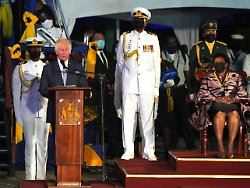Tuesday, November 30th, 2021
Queen no longer head of state
Barbados breaks away from the British crown
With Barbados, Queen Elizabeth II’s territory becomes a little smaller again. In time for Independence Day, the former British colony is being transformed into a republic and will receive a new head of state. Prince Charles is also invited to the historic event.
On the 55th Independence Day, Barbados adopted a new form of government – the Caribbean island renounced the British monarchy and declared itself a parliamentary republic. Last night, in the presence of the British heir to the throne, Prince Charles, the judge Sandra Mason was sworn in as the first female president and new head of state of Barbados. Shortly after midnight there was a gun salute for Mason and a parade of civil servants in National Heroes Square in the capital Bridgetown.
Not there was a statue of the British Admiral Horatio Nelson, which had stood there for a good 200 years – until a year ago. Amid protests against racism and colonialism around the world, the government removed the statue from the central square where the country’s heroes are to be honored. “If we don’t know who we are; if we don’t know what we want to fight for, then we are doomed to be exploited and colonized again,” said Prime Minister Mia Mottley. The break with the crown had been announced two months earlier.
“It is time to leave our colonial past completely behind us,” said Mottley in the annual so-called Throne Speech. Mason read the address in her previous role as governor general of the island state – i.e. representative of the queen. In October, the Barbados parliament elected the 72-year-old to the newly created office of president. Mottley remains head of government. The reaction of Buckingham Palace was cautious: The matter was “a matter for the government and the people of the Commenwealth State,” it said in September 2020.
“Even if some things change, some things will stay the same”
Prince Charles, who represented his 95-year-old mother in Barbados, emphasized there: Even if some things change, some things will remain the same – such as the “close and trusting partnership” and shared values. The Commonwealth of Nations is a loose association of states that emerged from Britain’s former colonies. The organization is headed by Queen Elizabeth II.
Barbados gained independence from Great Britain on November 30, 1966, but the Queen remained head of state until now. Most recently in 1992, Mauritius, a Commonwealth member, broke away from the monarchy.
The first English settlers came to Barbados 394 years ago. Soon they enriched themselves by growing sugar through African slaves. In his 2016 book “The First Society of Black Slaves”, the Barbadian historian Hilary Beckles described the island between 1636 and 1876 as “the most systematically violent, brutal and racially inhuman society of modern times”. Because of this history, there are demands for reparations and votes against the visit of Prince Charles in Barbados, as the activist Suleiman Bulbulia wrote on Monday in the British newspaper “The Guardian”.
At the same time, the country with almost 300,000 inhabitants is also called “Little England” due to the strong influence of British culture. “Of course Barbados will maintain a close relationship with the UK,” said Bulbulia. But this is a new era. “As for ‘Little England’, these times may call for a new nickname.”
